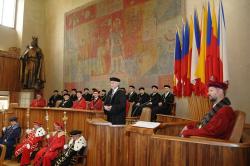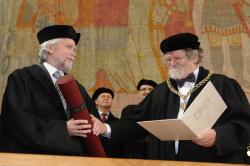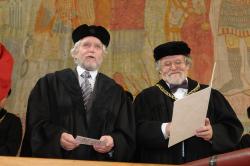Mathematician Endre Szemerédi receives doctorate honoris causa






15 June 2010
On June 15, 2010, professor Endre Szemerédi received doctorate honoris causa of Physical and Mathematical Sciences. Based on a decision of the science committee, the doctorate was presented by Charles University's promotor, professor Jaroslav Nešetřil.
“Professor Szemerédi was one of the first to realize the importance of theoretical computer science and became renowned in the field. As always, he has focused on key areas: sorting, complexity of Boolean operations and expanders,” said professor Nešetřil.
“Czech students are on a remarkable level thanks to top quality mathematical education,” said professor Szemerédi, a long-standing director of the REU International exchange programme, under which students of the Faculty of Mathematics and Physics study at top US universities. Szemerédi maintains close ties with the Charles University Faculty of Mathematics and Physics and his annual lectures have a profound influence on the work of the faculty's scholars and students. In this respect, Szemerédi follows the footsteps of his teacher Paul Erdös, also a doctor honoris causa of Charles University.
“Most of the time, I make errors in mathematics, especially when working on something new. Then I have to start from scratch and rarely get to the right result,” admitted professor Szemerédi, a recipient of many domestic and international awards, including American Mathematical Society's Leroy P. Steel Award from and the Swedish Royal Academy's Rolf Schock Award.
Professor Szemerédi is the author of many famous results in mathematics and theoretical computer science. Some of them are fundamental in their nature and can even be explained in layman's terms. This is very rare in abstract fields like these and proves the universality and profoundness of his work. The famous Szemerédi theorem, for instance, states that each dense set of integers contains an arithmetic progression of arbitrary length. His proof not only solved the old and well-known Erdös-Turán problem, but is also one of the cornerstones of number theory and contemporary mathematics as such.
Another example is the Szemerédi's regularity lemma, which states that every large enough graph can be divided into subsets of about the same size so that the edges between different subsets behave almost randomly. His work in theoretical computer science includes optimal sorting algorithms, one of the basic problems of data processing. He also worked in the fields of geometry and probability. In all of these, Szeremédi's works bear the stamp of absolute quality and universality, and are of fundamental nature.
Translation: Jaroslav Švelch
